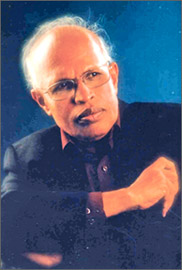Literature through Buddhist eyes
 The Buddhist Literary Festival 2011 was held on September 26
organised jointly by the All Ceylon Buddhist Congress and the Ministry
of Buddha Sasana and Religious Affairs to recognize and honour the
authors who contributed to the nourishment of Buddhist literature during
the year 2010. The Buddhist Literary Festival 2011 was held on September 26
organised jointly by the All Ceylon Buddhist Congress and the Ministry
of Buddha Sasana and Religious Affairs to recognize and honour the
authors who contributed to the nourishment of Buddhist literature during
the year 2010.
The G C Malalasekara Commemoration Award was presented to Prof W S
Karunathilake and the Solias Mendis Commemoration Award to artiste D G
(Di Ga) Somapala.
The journal published on the occasion contained several interesting
and valuable articles, including a chapter from Ven Polwatte Buddhadatta
Thera on the great Buddhist philosopher Ven Aryadeva who lived in India
about 1900 years ago, on music and Pirith chanting by C de S Kulatillake
and a story written by Ven Balangoda Ananda Maitreya Thera in 1930.
All works of fiction can be viewed according to the Buddha Dhamma.
All literature is about life around us, our society and our actions and
thoughts and dreams. They reflect the impermanence of all matter and all
life, the unpredictability on the one hand and also the cause and effect
of our actions on the other.
One of the most interesting events of the Buddhist Literary Festival
is the Keynote address. The address at the Buddhist Literary Festival
2010, was made by Ven Prof Induragare Dhammaratana Thera who was able to
see embedded Buddhist philosophy even in a film like 'Titanic', or in a
popular song.
 |
|
Di Ga
Somapala |
This year key note address was by Ven Prof Agalakada Sirisumana
Thera. He began with the ancient Indian concept of "Anandayen Prangawa"
(Wisdom from delight).
Then he reminded us of an example from the Tripitaka, Uddesavibhanga
Sutta in the Majjhima Nikaya, about how monks go to venerable
Mahakaccana thero to seek a detailed exposition of the very brief
exposition made by the Buddha.
Then he took us through the long history of Buddhist literature and
reviews, reminding us of Gurulugomi, Buddhaghosa, king Abasalamevan,
'Vyakyana Sampradaya', 'Dampiya Atuwa' and the Hela Atuwa Sahitya and
the Sanna Sahitya.
What he gave us in his speech, would have taken us through many
months of research, wading through many books, if we tried to gather
this knowledge on our own.
Ven Prof Sirisumana Thera mentioned how Martin Wickramasinghe's
Viragaya was misunderstood by many who considered it a defeatist novel,
without seeing the deep Buddhist philosophy in it.
The same fate that befell Viragaya fell on Simon Nawagattegama's
'Sansararanyaye Dadayakkaraya' perhaps because we refuse to see the real
story in it, which was influenced by Nawagattegama's views on Buddhism.
In all creative arts, we can see the basic Truth, presented to us by
the Buddha, because it is a universal Truth engulfing all time and space
and matter. Even a film or a painting which could be at first glance
considered erotic, could still convey the truth of impermanency and the
evil effects of (kama) thanha. The same could be said of a troupe of
maidens performing a dance, if we think of the following words in the
Dhammapada about the human body, and then we could not consider it
inappropriate at a Buddhist function.
"It is a bag held up by bones, plastered with skin,
full of blood and flesh. In it lives only aging, sickness, death,
pride & deceit."
Philosophers and literary critics have found Buddhist thoughts in
many works of great writers around the world, even though some of them
may not have known of the Buddha's teachings. Among them we could list
Sophocles, Spinoza, Rousseau, Kierkegaard, Kafka, Sartre, and many more.
"...various similarities exist in the content of Sartre's
phenomenological existentialism and Theravadin Buddhism, with the major
difference between the two lying in the materialistic, this-worldly
orientation of the former as opposed to the transcendent other-worldly
orientation of the latter." Sander H.Lee.
"Anatman - one of the central concepts of Buddhism - is likewise a
central concept in existential psychology. As Sartre put it, our
existences precede our essences." C. George Boeree, Shippensberg
University.
"The word "phenomenon" (from the verb phainesthai, "let see," which
is similar to the Pali ehi-passiko) has two meanings relevant for
philosophy. The first is "to show itself," the second, "to seem as."
Contemporary phenomenological philosophy uses it in the first sense, as
"merely letting something be seen, letting entities be perceived."
The secondary meaning, indicating something which seems to "remain
hidden, or which relapses or gets covered again, or shows itself only
'in disguise,'" points to the historical process of constructing
theories and "views" (Greek doxa, Sanskrit dristi, Pali di.t.thi) by
which the primordially "uncovered" phenomena are rather concealed again,
or kept in disguise." Bhikkhu Nanajivako.
Buddhist literature should not be limited to stories of the life of
the Buddha or His disciples, or based on Jataka tales. For the annual
awards the organizers and the judges should consider all works of
fiction published in Sinhala, because a totally a-religious novel could
sometimes be the best work to convey the Buddha's message.
Most Buddhist literature could be considered a-religious. They could
be appreciated by everyone, and thus are of universal interest. The All
Ceylon Buddhist Congress should also consider the Buddhist Literature in
English and Tamil too, if Sri Lanka is to be the real hub for Theravada
Buddhism in the world. At present even in the USA the American Buddhist
Literature is more on Zen and Mahayana Buddhism and their attention
should be drawn to Theravada Buddhism too.
[email protected]
|



